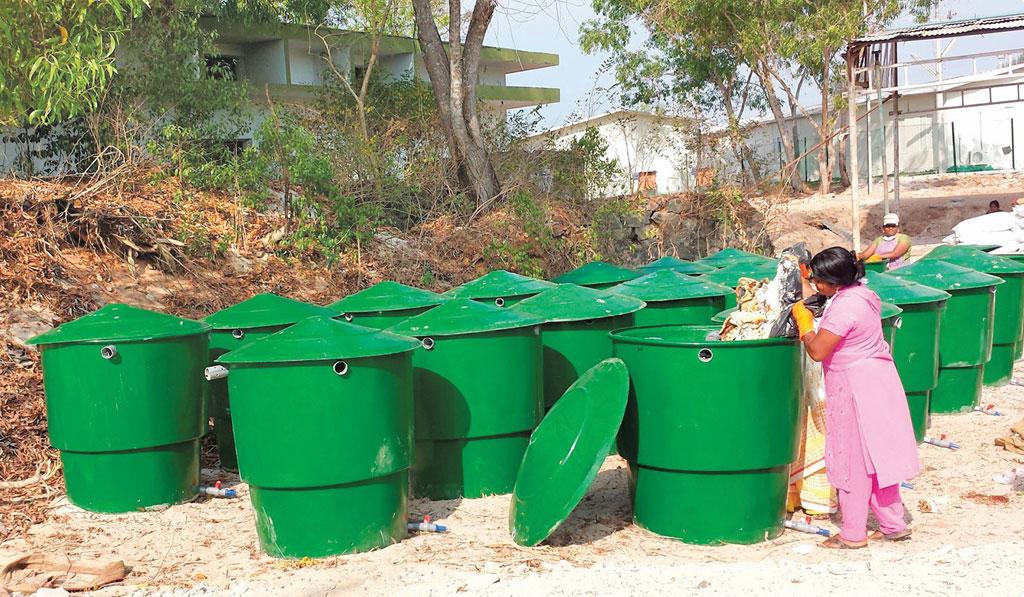

The Kerala government popularises a model that minimises the creation of waste



It was first practiced at an international workshop on zero waste in Kovalam in 2000. Called the Green Protocol, the new age waste management system has today been replicated and implemented all across Kerala and has now become a movement. Many institutions have adopted this initiative, including the state legislative assembly complex in Thiruvananthapuram. Attukkal Pongala, a religious festival where over four million women congregate in the state’s capital, has enforced the methods of the Green Protocol.
Schools and festival venues too have adopted this waste management model.
So what is Green Protocol? It is essentially a set of measures, which when implemented, results in a significant reduction of waste. The significance of Green Protocol is this: as waste reduction occupies the top position in the waste management hierarchy, the Green Protocol’s methodology is focused on the prevention of waste generation. More importantly, implementing the Green Protocol can save money as well as resources. It has emerged as one of the most efficient and sustainable models in waste management.
Ask K Vasuki, executive director, Suchitwa Mission, a state government organisation. When she realised that the National Games—held in Thiruvananthapuram in January 2015—was going to generate over 120 tonnes of waste, she collaborated with the organisers as well as the local self-government department that deals with local panchayats and municipalities to search for ways to deal with the waste. The consensus among the stakeholders was that the games should be organised in such a way that no waste is generated.
That’s when it was agreed to implement the Green Protocol.
Eliminating waste creation
The National Games has become a showcase for the Green Protocol. Banning the use of disposable pet bottles helped the organisers save around Rs 1.5-2 crore. And this was just the beginning. When the participants arrived, they were requested to comply with the Green Protocol, which included water being sold only in steel glasses— Rs 2 per glass. The volunteers would wash the glasses with disinfectant solutions and replenish the glasses.
The Green Protocol also put a complete ban on disposables in the catering area. Only reusable cutleries were allowed to be used. Beverages were also served only in reusable glasses.
Plastic usage, including packaging and bottles, was not allowed unless it had a sticker, that cost Rs 10, stuck on the item. This deposit money would be returned only when the sticker was given back. This technique made sure that no plastic item was thrown away and prevented littering almost completely.

All the wastes generated were segregated. Food wastes were composted using the “bio bin” method, where coconut husk is used to decompose the organic waste. This helped curb at least 100 tonnes of mixed waste. A material recovery facility helped recycle materials.
“The only problem we faced was during the planning phase. The organisers were a little apprehensive about using the same utensils to serve water for reasons of hygiene. However, the Suchitwa Mission representatives were able to convince the organisers and the Green Protocol was implemented,” says C M Manoj, former joint secretary of Suchitwa Mission.
Waste milestone
"Green Protocol is nothing but a lifestyle of using less and reusing waste, which we had in our heritage. We have lost this culture to consumerism. We need to reinvent it. It is not just about waste management, but also about efficient resource management," says Reshmi C R of the Kochi Metro Rail Limited, who attended the games.
The Green Protocol has a Standard Operating Procedure that enables its replication in any public or private event in any part of the world. “The Green Protocol is a milestone for waste management in Kerala,” says Shibu Nair of Thanal, a non-profit based in Kerala. In an era of disposable culture dictating our waste management paradigm, the Green Protocol has not only proved that it is an environmentally sustainable model, but it is also an economically prudent one.
Plastic pathways
 The Clean Kerala Company Limited, formed under the local self-government department, is promoting shredded plastic waste to construct polymerised roads. The project started in October 2016 and so far, 60 km of polymerised roads have been constructed using 42 tonnes of shredded plastic. The shredded plastics are procured from the local bodies, which include panchayats and municipalities. It is expected that the project will generate more than 16,700 direct employment opportunities. It will particularly help members of Kudumbasree, a women empowerment and poverty eradication programme whose members are from the lowest strata of society. They will be employed to source clean plastic rejects from households as well as from other sources. There are already reports that the quality of roads has improved due to the use of shredded plastics, and the government is planning to scale up the project and convert Kerala into a zero waste zone. |
The article was first published in July 1-15, 2017 issue of Down To Earth magazine
We are a voice to you; you have been a support to us. Together we build journalism that is independent, credible and fearless. You can further help us by making a donation. This will mean a lot for our ability to bring you news, perspectives and analysis from the ground so that we can make change together.
India Environment Portal Resources :

Comments are moderated and will be published only after the site moderator’s approval. Please use a genuine email ID and provide your name. Selected comments may also be used in the ‘Letters’ section of the Down To Earth print edition.